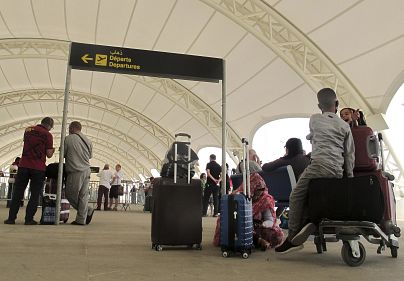"I feel this is my grandparents' generation when they emigrated from Greece to the US and never saw their parents again," Pauline Manos, an American who has lived in Brussels for 30 years, told Euronews.
"You do feel trapped with your hands tied," Pauline Manos, an American who has been living in Belgium for over 30 years, told Euronews.
She, like millions of US citizens who live in Europe, hoped she would be able to fly back home during the coronavirus pandemic to visit her elderly parents aged 89 and 78, who live in Los Angeles and who she has not seen since Christmas.
But that journey was denied to her since the European Union left the US off its list of "safe countries", citing epidemiological factors as a concern.
The EU-27 bloc approved 15 non-EU countries for business or leisure travel on Tuesday. But barred other countries such as the US, Russia, Brazil and Turkey, as their containment of coronavirus is considered worse than the EU average and will therefore have to wait a couple of weeks for approval.
"Suddenly I feel this is my grandparents' generation when they emigrated from Greece to the US and never saw their parents again... and letters would take three months," said Manos, a volunteer for the American Club of Brussels association.
Although she could visit the US for emergency reasons, she is concerned about her safety as the US is the worst-affected country in the world with more than 2.6 million COVID-19 cases.
"Things are getting worse in the States, " she said, adding one of her fears, amongst other, is she could get stuck there with no healthcare.
"Will you have travel issues and do you want to be on airplane for 15 hours? Do you want to go through three or four airports because flights are limited? And how do you quarantine?"
Long term impacts
While family separations are temporary, it could change future transatlantic relationships in the long term.
"Americans contemplating moves to Europe or other overseas locations may not follow through out of concern that disrupted travel and enforced separation becomes an unacceptable 'new normal'," William Jordan, president of the Paris-based Association of Americans Resident Overseas (AARO), told Euronews.
"Some Americans living in Europe may similarly decide to move relocate back to the US," he added.
COVID-19 and the labour market
Manos, who also works as a marketing consultant, said the travel restrictions have also wreaked havoc on her work.
"I do my work outside the US, but of course a lot of my business contacts and professional activities are coming to an end," she said.
With the global economy set to take a €10 trillion hit from the pandemic, according to the International Monetary Fund, businesses have felt the full blow.
While companies have adopted online solutions to take the place of business travel, there could be repercussions in the long term.
"Transatlantic recruiting may grind to a halt due to logistical concerns (e.g., moving effects), the deterrent effects of not being to move easily for personal travel (e.g., visiting relatives), and changes the economic impact of COVID-19 on labour markets could bring to work visa regulations," Jordan said.
"The recent US presidential proclamation suspending many categories of work visas is a good example of what to expect," he added.
Message that 'Americans not welcome'
The travel and tourism industries have been some of the hardest hit, with airlines suffering their worst year on record, according to the International Air Transport Association (IATA).
"I think in reality what we're looking at is minimal demand in the short term," Tom Jenkins, CEO of the European Tourism Association (ETOA), told Euronews.
While he said the biggest tourism market for Europe is travel within Europe, the ban could affect transatlantic holidays.
"What's concerning is the messaging that goes out with it that Americans aren't welcome at the moment, which coincides with a six week leave time to the high season," he warned.
The peak season begins on September 1, around Labor Day.
There are a lot of bookings still sitting there from Americans who made their plans before March and they booked a high season vacation to Europe, Jenkins said.
"Those [bookings] are still there, unless they get this [the travel restrictions] turned around within two weeks, we will start to see a lot of cancellations come in around peak period which would be very devastating."

















